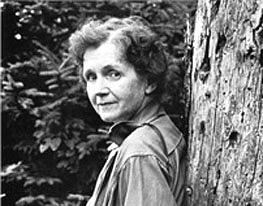Photo credit: ILRI
“Those who contemplate the beauty of the earth find reserves of strength that will endure as long as life lasts.” – Rachel Carson
What would Rachel Carson do in the age of Trump? May 27 is her 110th birthday. How would this courageous woman respond to the Trump administration and its attempted corporate coup d’état, were she alive today?
When Carson wrote “Silent Spring” to warn the world about the dangers of indiscriminate pesticide use, she knew she’d face the wrath of the chemical industry and its cronies in government. But she sounded the alarm anyway.
The book built on a lifetime of quietly courageous acts. She grew up in poverty and financially supported members of her family throughout her life. When her niece Marjorie died, she adopted Marjorie’s son, Roger. She rejected many expectations put upon women at the time: she never married, she did graduate work in biology though there were few women in the field, and she rose through the ranks of the U.S. Bureau of Fisheries when it was dominated by men.
When Carson published “Silent Spring” in 1962, the pesticide DDT was everywhere. Seen as a miracle fix for health and agriculture, it was sprayed in forests, fields, farms, homes, and directly onto people. It had practically eradicated malaria in the U.S. when “Silent Spring” was published. But the benefits were declining, and the tolls were mounting. Many species of insects targeted by DDT were becoming resistant. Meanwhile, birds of prey were being decimated, with the bald eagle nearly going extinct. DDT was also risking human lives: The pesticide is considered a possible human carcinogen.
Reluctant firebrand
Although Carson believed people had a right to know the risks posed by pesticides like DDT, she didn’t want to write “Silent Spring.” Not only would it take years of her life to research and write the book, but she knew that if she published it, she’d be attacked by industry. She tried to persuade other authors, including E.B. White, to take up the mantle. But they refused, not wanting to face inevitable retaliation.
Carson faced a tough decision: stay silent, or speak up. She chose the latter and committed four years of meticulous research and writing to create “Silent Spring.” The book investigates the effects of pesticides, including DDT, on ecosystems beyond the insects they were meant to control. And it makes a deeper argument about the relationship between people and nature, arguing that human efforts to overpower nature are ultimately self-defeating.
Once she published, the chemical industry and its allies in government came after her, just as she predicted they would. They argued against the points in her book and used sexist stereotypes in an attempt to discredit her. Former Secretary of Agriculture Ezra Taft Benson wrote to Dwight Eisenhower that, because she was unmarried, Carson was “probably a communist,” and he wondered aloud why “a spinster was so concerned with genetics.”
She held her ground, and the book became a best-seller that shifted the public climate forever. President Kennedy commissioned a study of pesticide use, and Carson got to testify before a Senate subcommittee on pesticides. There she presented policy recommendations she’d been developing over five years: not a ban, but an end to aerial spraying and “citizen’s brigades” acting as watchdogs guarding against misuse of pesticides. Eliza Griswold recounted the story for The New York Times in 2012: “She was 56 and dying of breast cancer. She told almost no one. She’d already survived a radical mastectomy. Her pelvis was so riddled with fractures that it was nearly impossible for her to walk to her seat at the wooden table before the congressional panel. To hide her baldness, she wore a dark brown wig.” Despite the pain she was in, she spoke clearly and persuasively.
Rachel Carson died soon after her eloquent testimony, but her warning in “Silent Spring” lives on. As a direct result of her work, DDT was banned in the U.S. — a policy that continues to this day.
Resist like Rachel
As the Trump administration tries to muzzle scientists and destroy environmental protections, let us look to Rachel as a model and mentor. Given her courageous actions, we know she would speak out to protect climate science, U.S. public lands, and lifesaving environmental policies.
As we celebrate her life today, we embrace her challenge to put ourselves in the way of policies that endanger human and non-human lives. Together we are ensuring that the fossil fuel industry does not get to keep its seat at the policymaking table. We are organizing to keep water systems public. And we’re moving McDonald’s to reduce the use of pesticides in its supply chain that are poisoning children in rural communities.
Many times we’ve been told that our goals are too lofty, too ambitious. “You’ll never get the fossil fuel industry out of climate policy.” Or, “water privatization is inevitable.” But Carson’s life shows us that having the courage to tell the truth makes a difference. So, now more than ever, let’s join together to name and change what’s broken in our world.



